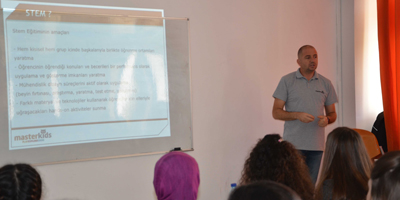STEM education is a method that can be applied from pre-school age to post-graduate age

European University of Lefke (EUL) Dr. Fazıl Küçük Faculty of Education Department of Basic Education organized a seminar on STEM education. Mert Balın, MasterKids Director, attended the seminar as a speaker.
STEM tells students that dealing with problems in daily life is also a mathematics
Touching upon the STEM and steam educations in the seminar, Balın stated that STEM education is an interdisciplinary learning approach and consists of the initials of Science, Technology, Engineering and Mathematics. “STEM, which aims to train competent individuals in all these areas, is an approach that will enable students to think differently and increase their ability to search for new solutions to various processes by telling them that dealing with problems in daily life is also a mathematics” he said. Balın also stated that STEM is a method that can be applied both within and outside the curriculum, from preschool to postgraduate.
STEM education needs to be combined with game-based learning
Pointing out that an interdisciplinary practice is needed to provide children with creative thinking, questioning, analysing, entrepreneurship and leadership, Balın emphasized the need to use these skills to develop and lead the country in the 21st century. Balın stated that STEM education should be combined with game-based learning and added that the integration of important disciplines such as science, technology, engineering and mathematics as well as with art will contribute to their development.
Giving advices on the future, Balın said that “In order to meet the requirements of the era, strategic steps should be taken in parallel with the developing Science and Technological changes. In this context, I think that we can come to a good position in many European countries related to STEM education by working in cooperation in order to make the studies possible”.
Stating that it is important to create awareness about the future as well as to give students different perspectives, Assist. Prof. Dr. Çağda Kıvanç Çağanağa presented Balın with a certificate of appreciation at the end of the seminar and thanked him for his contributions.
